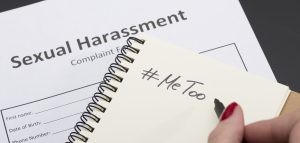 As the #MeToo movement is maturing into its second year, there’s been a greater effort to collect data about the real scope of sexual harassment in the workplace. Toward that end, FTI Consulting and Mine The Gap have released the results of their research on gender dynamics in the workplace. They surveyed 4,764 professional women and 1,030 professional men across the industries of technology, finance, legal, energy and healthcare, and the results are astounding.
As the #MeToo movement is maturing into its second year, there’s been a greater effort to collect data about the real scope of sexual harassment in the workplace. Toward that end, FTI Consulting and Mine The Gap have released the results of their research on gender dynamics in the workplace. They surveyed 4,764 professional women and 1,030 professional men across the industries of technology, finance, legal, energy and healthcare, and the results are astounding.
As Elizabeth Alexander, a Senior Managing Director at FTI Consulting and a crisis communications and gender inclusion specialist, noted:
“From all different viewpoints and industries, the research findings are stark: #MeToo at work is still happening, and employers that fail to take meaningful action to bring about change face a high risk of irrecoverable reputational and financial consequences. The research shows that professional women will wield their purchasing power and their talent as leverage for change: nearly half of the women surveyed said they would be less likely to apply for a job, buy products or stock from a company with a public #MeToo issue. For businesses to remain viable as the #MeToo movement continues to grow, entire industries need to look inward and overhaul policies, protocols, reporting mechanisms and trainings; evaluate cultures; take steps to fix gender imbalances; develop effective and transparent communications plans; and most importantly, hold aggressors, and those in a place to stop inappropriate behavior, accountable.”

How LexisNexis CourtLink And Lexis Snapshot Deliver Business Wins
These tools demonstrate that information is power.
You can look at FTI’s full results to get a sense of the scope of the issue across all industries here. But Above the Law obtained the exclusive break out of how the legal industry stacks up.
56 percent of women in the legal industry said they were more likely to have a negative opinion of a company that is facing a public #MeToo issue, and 49 percent of men in the legal industry said the same. This is similar to the 53 percent of all women surveyed and 50 percent of all men that said the same. 59 percent of women in the legal industry and 44 percent of the men there indicated they’d be less likely to apply for a job at an employer that had a public #MeToo problem (compared with 55 percent and 43 percent respectively for the full population). So in these aspects, the legal industry is very much in line with the general population.
The truly interesting data comes from looking at the experiences with discrimination of women in the legal industry. When asked if they have personally experienced or witnessed unwanted touching in the workplace within the last year, 27 percent of women in the law said they had. The data was further broken out by levels of experience, and as women climb up the ranks of the profession they are more likely to deal with these issues. 25 percent of entry-level women say they’ve experienced or witnessed it in the last year, compared with 33 percent of senior level women. Remember this question was specifically limited to the past year — after #MeToo was a thing — and women in the legal industry, particularly those in senior positions, are still experiencing harassment.
When the question was broadened to include experiences from the last five years, but limited to personally experienced sexual harassment or sexual misconduct, 26 percent of women in the legal industry said they had experienced harassment or misconduct. Again, senior-level women in the profession are more likely to have experienced sexual harassment in the last five years, with 36 percent saying yes to the question, compared with 24 percent of junior-level women and 21 percent of mid-level women.

How MyCase Accounting Transforms Legal Bookkeeping
This complete system built for lawyers simplifies the complex world of law firm finance.
As to whether these incidents were reported, 50 percent women in the legal industry say they reported the harassment, which is less frequently than compared to the responses for all women surveyed, who reported sexual harassment 57 percent of the time. According to the survey data, the number one reason why women in the legal profession did not report harassment was not wanting it to negatively impact their career, followed by not wanting to seem like a difficult employee and a fear of retribution.
These numbers are unsettling but prove the legal profession isn’t insulated from sexual harassment and needs to take action to stop the problem.
[pdfjs-viewer url=”https://abovethelaw.com/wp-content/uploads/sites/4/2018/10/FTI-MTG-Public-Release-Topline-MeToo-at-Work-LEGAL-10.17.18.pdf”]
 Kathryn Rubino is a Senior Editor at Above the Law, and host of The Jabot podcast. AtL tipsters are the best, so please connect with her. Feel free to email her with any tips, questions, or comments and follow her on Twitter (@Kathryn1).
Kathryn Rubino is a Senior Editor at Above the Law, and host of The Jabot podcast. AtL tipsters are the best, so please connect with her. Feel free to email her with any tips, questions, or comments and follow her on Twitter (@Kathryn1).